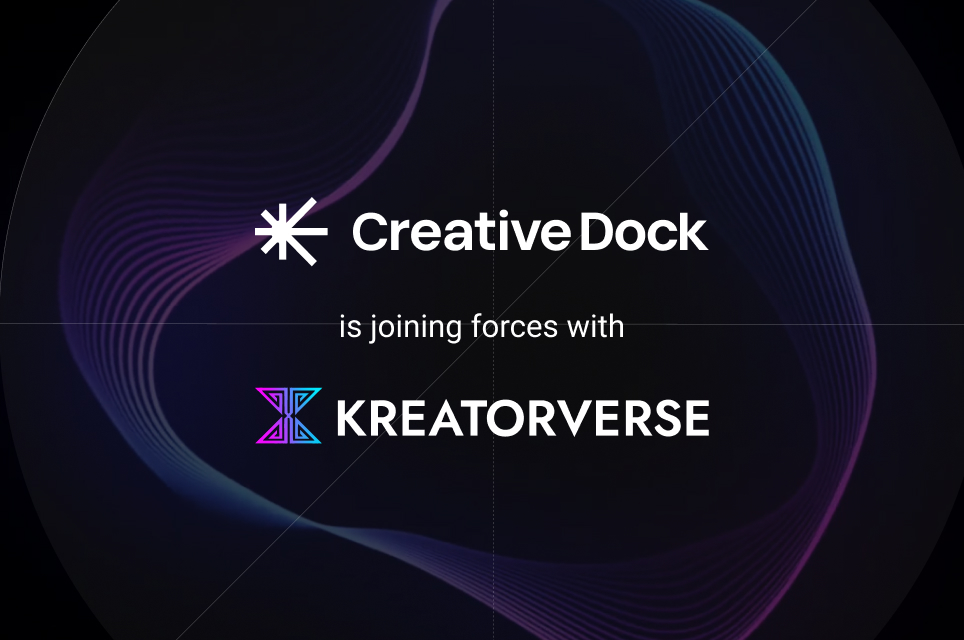“European economy has a certain DNA to reinvent itself.” Talking future strategies with serial innovator Heinrich Arnold
“As an individual, you can probably survive if you decide to avoid digitalization. But not as a society,” claims Heinrich Arnold drawing upon his experiences as a lifelong innovator. He significantly contributed to turning Berlin and Israel into high-tech hot spots, received an honorary professorship at TU Berlin, and helped build over 70 businesses either as director of research and innovation at Deutsche Telekom AG or as a supervisor and investor.

Creative Dock is growing, our ambition is to make Europe a digital leader and bring our products to a billion people around the world over the next five years. We are also forming a much tighter circle of people who care about digital as much as we do. Entrepreneurs, current and former CEOs of large banks or insurance companies, headhunters, open minds. We call them Pioneers. Gradually, we will be interviewing them on digitalization and other topics that are close to their hearts. Below, read our first interview with innovator Heinrich Arnold.

In various roles, you have helped build more than seventy businesses. What was the impulse to connect with Creative Dock, a company that builds businesses for other businesses, via its Pioneers Circle?
I have been on the advisory board of the Davidson Technology Growth Fund. About 2 or 3 years ago, Creative Dock was testing waters to get growth capital from Davidson capital. And I was asked to have a look at it. I got the sense that Creative Dock might be more pragmatic than the other venture builders I had seen and liked it right away and was even more surprised that I had never heard about it before. Venture building is probably one of the few chances that really work to digitally transform established companies and help them diversify and embrace the 90% of business potential which established companies usually miss to embrace. And even though Davidson Capital decided not to invest in it, I promised I would bear Creative Dock in the back of my mind.
And when Creative Dock came to the top of your mind again?
Last year. I have been an advisor to the Belgian company Bekaert (Bekaert is one of Creative Dock’s clients). Bekaert asked me to help them with innovating their business and ventures. Bootstrapping the most important innovation activities I aimed for the most practical approach, so I suggested venture building and invited Creative Dock as one of the companies to pitch.
Yet, we came second on that pitch…
Yes, Creative Dock turned out to be the second, but we decided to start with two companies, not just one. My expectation that Creative Dock is in one decisive aspect very different from its competitors turned out to be true: Creative Dock’s “drive to the customer” — i.e. customer and business orientation — is by magnitudes stronger, and therefore the probability for tangible new business.
And then the story continued and you became a member of Creative Dock’s Pioneers’ Circle. What do you expect from it?
When Creative Dock acquired Rohrbeck Heger (RH) following my advice, Creative Dock has built up a second decisive USP: matching the design thinking options with real feasibility. Roadmapping of technical capabilities is the core competency of RH and none of the other venture builders has this. An aspect which I have always experienced as painful. I perceive the Pioneers’ Circle as the ecosystem extension of Creative Dock but most important of all to bring the best offer to the customers that need it and facilitate the European way of transforming the economy.
In your 2020 article The Responsibility of Owners and Supervisory Boards in Securing the Future of Established European Companies you use the term “technology shock”. Isn’t the shock even bigger after two years of covid?
This technological change is actually still growing in force, and I believe the most significant aspect of it revolves around data. Now we can collect data about all types of things. What are you going to buy? When? Where? We collect data in real-time, but that’s not the end game. That will come when the platforms will be able to do prognoses. What are you going to decide two months from now? Which materials will be in short supply then? Which trends will prevail in… whenever? As I said already, I know that most European companies waste 90% of new business and thus valuation when they don’t work with the data which their products, services, and processes entail.

What do you think will be the next big thing after Big Data?
The next big things? I’d say augmented reality, artificial intelligence, and autonomous systems, but all of these are just in their early stages. The effects are the order of magnitude changes and will be massive but are still not yet visible. We don’t have autonomous systems in logistics, traffic, or most parts of our lives yet. Take administration as an example: it’s far from being autonomous, it’s far from being automated and that’s all about to change.
Are companies prepared for that?
Speaking about general willingness to change, I have encountered a lot of skepticism in the European economy. People aren’t easy to convince and they are wondering what is different this year from 20 years ago? Why should we change it now, and is it not just a passing trend? At the same time, the technology shock is getting bigger and bigger. It is simply hopeless for companies to try to optimize their existing business model by improving it by 20% when there is an alternative business approach that is 100 times more efficient. And then comes the question of who should be responsible for making a radical change.
The title of your article suggests it is the owners and board members.
Exactly. You need to put the right people in place, not the ones who can optimize the business model of yesterday, but the ones that can create the business model of tomorrow. That’s a much harder question than finding a guy who has done a certain thing already. You need to do a very tricky thing: translate the future into a strategy. That’s how I came about the supervisory boards’ and owners’ responsibility.
Wouldn’t it be more efficient to just build everything from scratch? Isn’t that what startups are supposed to do?
It depends on what part of the world you are talking about. In the United States and China, there is a much higher proportion of business from new companies. In the US, 10% of all jobs are created newly on an annual basis by startups. Do the math: the US entire economy can renew itself in 10 years. In Europe, only 1% is created newly by startups. Despite myself and many other people promoting the startup ecosystem, we cannot rely on that because at the current pace it will take us a hundred years to reinvent the European economy. Startups need to be heavily promoted, but it’s not sufficient.
What more could be done, then? Should we then focus more on established companies?
If it should be value created in Europe, then there is no other alternative than to work with established companies massively. The good news is that these companies are much more resilient. For example, the Henkel of today is probably a totally different animal than the Henkel of 145 years ago. Europeans and the economy here have a certain DNA of reinventing themselves. They have done it several times. They have gone through two world wars, economic crises, and changes in societal regimes. 145 years ago, we would have been here talking about kings and emperors and aristocracy. It was a totally different world and these companies made it through all of these things, so there is a good chance that they will get through again.
Do you have examples of companies that have dealt with the technology shock well?
The master example is Intel. For decades, they managed to stay around in a superfast moving environment. Every 18 months computing power needed to double, so they went through the technology shock basically every 18 months. Back then, professor Robert Burgelman from Stanford was examining the work of Intel’s CEO Andrew Grove. He was wondering what does Andy Grove know that other people don’t? How is he so adept at foreseeing the future? Unsurprisingly, Burgelman found out that Andy Grove could not predict the future. But he understood a different secret: that people responsible for the last successful product generation are definitely not the ones who will be brave enough to invent the next successful one.
How did Grove translate this secret into the way he led Intel?
He made sure that there were sufficient alternative approaches to technological diversification in the company. When the last successful product architecture came from Seattle, he made sure that there was another team working in parallel on the next generation in Herzliya, Israel, or in Los Altos, and therefore, he triggered enough alternative approaches.
But can such an approach be scalable to different industries?
Already in my PhD thesis, I examined the machine tool industry, which tends to be very slow. I found that there has been a dramatic technological shock in the industry when analogue control has been replaced by computer numerical control. The Japanese were going to take over the whole market. Half of the European companies, most British and even Swiss manufacturers, including some world market leaders at the time, went bankrupt. But a few smart ones started to diversify. The agile and open-minded ones put up product lines with new numerical controls based on Siemens technology. These are the ones that are still around and thanks to them there is still a machine tool industry in Europe.
Sure, there is probably no area in which companies can survive unless they adapt to technological shock. But when you look at the demographics of Europe, aren’t there still many customers who don’t care about digital?
Anyone who stays out of digital will ultimately be less competitive. Whether it’s an individual or a business. Unfortunately, in Europe, we are losing. Not entirely, but we need to understand that we are living in a global competition. So as an individual, you can probably survive if you decide to avoid digitalization. But not as a society.

How much are European societies lacking behind in this respect?
I was staying in Shanghai 20 years ago, and that was one shock of my life. When you asked me how many hours a day I work, it actually seems like a vacation compared to the Chinese. I heard the construction hammers 24/7. We can talk about the quality they produce but they are super committed. And we have to understand that we compete with this level of engagement.
Besides China, another place you know very well is Israel. You even received a medal of honour from the Israeli ambassador. What it was for?
The Israeli Negev city of Beersheva was way more dramatic than the innovation miracle in Berlin. An almost hopeless place that turned into a high-tech hotspot thanks to public-private partnerships. Fifteen years ago, the not-so-well-known Ben-Gurion University of the Negev desert decided to take the Berlin blueprint to Israel and closed a partnership with Telecom/T-Mobile and the Berlin Institute of Technology, where I was leading the innovation work. The Israelis are extremely grateful for the beginnings, so that’s where this medal of honour came from.
What exactly came out of this partnership?
The people at Ben-Gurion were brain surgeons and data analysts at the same time and they thought that what goes on in the brain’s neural networks might be applied to IT networks as well. It turned out this premise was correct and they came up with super-interesting things through this first partnership. Later, they closed other partnership with IBM, and eventually, gained 36 companies on board and turned the Ben-Gurion University into a high-tech park, a heavyweight in cyber security with now 10000 people working in this field now, there.
Former CEO of Deutsche Telecom Ron Summer once said that part of Israel’s success is the notion that it’s very common or normal to fail. Unlike in Germany, where failing is perceived as a stigma. Do you think that it has changed already?
My thesis advisor, professor Harhoff, director of Max Planck Institute for Innovation and Competition, was super-frustrated with this 25 years ago. He used to say that nobody wants to be an entrepreneur in Germany, that all the young people are extremely conservative and want to work for big companies. Back then, it was probably true. And this has totally changed. Nowadays, the first career choice for many is to start their own company.



.webp)










%20(1).jpg)































































